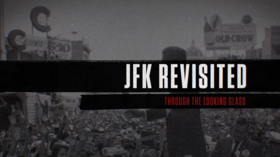Biden's foreign policy is built on one big lie
The US squandered an opportunity after the Cold War to embrace a “new world order” that promoted a multi-polar, rules-based international order and opted to embrace an American singularity. Reality has caught up to this vision.
Once upon a time, there was a bipolar world, where two competing superpowers – the United States and the Soviet Union – engaged in a “Cold War” defined by ideological and economic conflict punctuated by military brinkmanship which took each nation to the edge of war with the other, only to have reason prevail.
The US was starry-eyed about what kind of nation it aspired to be – according to Ronald Reagan, a “shining city upon a hill” that served as a beacon for the world, “a tall, proud city built on rocks stronger than oceans, wind-swept, God-blessed, and teeming with people of all kinds living in harmony and peace; a city with free ports that hummed with commerce and creativity. And if there had to be city walls, the walls had doors and the doors were open to anyone with the will and the heart to get here.”
The Cold War, however, also made the US clear-eyed about the reality of the world it lived in, one where superpower competition superseded idealistic notions of freedom and liberty for all. In her landmark essay, “Dictatorships & Double Standards,” Ambassador Jeane Kirkpatrick spelled out in stark fashion the realpolitik which governed America’s relationship with the world when engaged in a zero-sum competition with the Soviet Union. “Though each of the rulers was from time to time criticized by American officials for violating civil and human rights,” Kirkpatrick wrote, “the fact that the people of Iran and Nicaragua only intermittently enjoyed the rights accorded to citizens in the Western democracies did not prevent successive administrations from granting – with the necessary approval of successive Congresses – both military and economic aid.”
Support of these dictatorships was essential to US national security, Kirkpatrick noted, given the dire consequences of failing to do so. “The American effort to impose liberalization and democratization on a government confronted with violent internal opposition not only failed,” she noted, “but actually assisted the coming to power of new regimes in which ordinary people enjoy fewer freedoms and less personal security than under the previous autocracy – regimes, moreover, hostile to American interests and policies.”
The so-called “rules-based international order” existed solely to advance the interests of the United States and its allies. As explained by Matt Yglesias, a conservative-leaning American journalist, “In the aftermath of World War II, the United States, guided by liberal internationalist principles, sought – successfully – to knit together a ‘free world’ of allied powers that interacted with each other in a cooperative, rules- and institution-based way. This made intra-Western international politics a series of positive sum interactions that allowed us to contain and out-compete our communist adversaries.”
When the Cold War came to an end, however, the US found itself competing only with itself for world domination. While the US briefly flirted with the idea of a United Nations-centric “new world order” under President George H. W. Bush, the reality was that the world was not positioned to assume a true multi-polar character, and instead gravitated to what the conservative commentator, Charles Krauthammer, called “the Unipolar Moment”, a post-Cold War reality in which the US ruled supreme. The “intra-Western international politics” (i.e., “rules-based international order”) that Matt Yglesias spoke of during the Cold War continued, except that the “positive sum interactions” it produced were no longer focused on containing and prevailing over a communist adversary, but rather on singularly promoting and sustaining American hegemony.
For the next 30-odd years, the US carried out a schizophrenic relationship with the world, bouncing from a pretense toward wanting to work in a multi-polar world (under Presidents Bill Clinton and Barack Obama) to a more honest policy that had America ruling supreme at the top of a global hierarchy designed by American foreign and national security elites to keep the US at the top (Presidents George W. Bush and Donald Trump.) While the US remained locked-in to the notion of a world subordinated to the will and whim of the US in perpetuity, other countries evolved into a post-Cold War reality where genuine aspirations to a multi-polar existence went beyond the merely rhetorical to a more practical posture where US hegemony was often seen as an impediment. The US relationship with the world was dramatically altered in the years following the events of 9/11, where the US squandered a real opportunity to become the leader of an ostensible “new world order” where a “rules-based international order” became the foundation of American-centric global stability as opposed to being simply a vehicle for sustaining unilateral US power.
This schizophrenic relationship with the world has manifested itself in the foreign and national security policy of the administration of President Joe Biden. In his interim national security guidance, issued in March 2021, President Biden channeled Ronald Reagan by postulating a world where American democracy served as the veritable “shining city upon a hill,” a beacon of governance which the world should aspire to. “I firmly believe,” Biden declared, “that democracy holds the key to freedom, prosperity, peace, and dignity. We must now demonstrate – with a clarity that dispels any doubt – that democracy can still deliver for our people and for people around the world. We must prove that our model isn’t a relic of history; it’s the single best way to realize the promise of our future. And, if we work together with our democratic partners, with strength and confidence, we will meet every challenge and outpace every challenger.”
The vision of American democracy as the model on which the nations of the world should base themselves was joined with the notion of a benevolent “rules-based international order” as a system which would promote both the interests of the United States and the rest of the world.
That system [i.e., the rules-based international order] is not an abstraction, Biden’s Secretary of State, Antony Blinken, said in a recent interview. “It helps countries resolve differences peacefully, coordinate multilateral efforts effectively, and participate in global commerce with the assurance that everyone is following the same rules.” According to Blinken’s history of the world, the “order” came into being following the founding of the United Nations after World War II and was based on common principles designed to prevent conflict, promote, and maintain dialogue, and build a system that would benefit all nations. “It was enlightened self-interest,” Blinken declared. “We believed other nations’ success was critical to ours.”
While the charade being perpetrated by both Biden (that American democracy served as the most viable model for the rest of the world to follow) and Blinken (that the rules-based international order existed to jointly promote the well-being of both the US and the rest of the world) might have been sustainable under the conditions of a singular US superpower reigning supreme, the reality was that the world had changed dramatically since the time when such notions could be seen as viable. In a recent presentation to the Aspen Institute, Chairman of the Joint Chiefs of Staff General Mark Milley noted that the world had moved beyond a post-Cold War singularity, with the United States entering a new, “tripolar” Cold War where the US, China, and Russia all compete as great powers.
Milley singled China out as representing the greater threat to the Biden/Blinken model of US-dominated global governance. China aspires to challenge the United States globally, Milley said. “They’ve been very clear about that. They have a China dream, and they want to challenge the so-called liberal, rules-based order that went into effect in 1945 at the end of World War II. They want to revise it. So, we have a country that is becoming extraordinarily powerful that wants to revise the international order to their advantage.”
When seen from the perspective of a rules-based international order which promotes the greater good of all nations, Milley’s comments promulgate the notion of China as a global outlier, a nation whose policies are antithetical to international peace and security. However, Biden’s National Security Advisor, Jake Sullivan, revealed the realpolitik core of the Biden embrace of a rules-based international order, which was almost Kirkpatrick-like in its honesty.
“The goal of America’s China policy,” Sullvan said in a recent interview, “is to create a circumstance in which two major powers are going to have to operate in an international system for the foreseeable future and we want the terms of that kind of coexistence in the international system to be favorable to American interest and values.” The goal of this policy, Sullivan noted, was “to shape the international environment so that it is more favorable to the interest and values of the United States and its allies and partners to like-minded democracies.”
There’s nothing wrong with a nation promoting its own well-being at the expense of others. However, Sullivan’s comments strip naked any pretense of Blinken’s fictional “enlightened self-interest” on the part of the United States in pushing a rules-based international order. The success of other nations is no longer seen as an important component of US policy, but rather a “nice to have” consequence. The primary objective of Biden’s foreign policy is the exclusive promotion of American hegemony. In this, Biden is following in the footsteps of his predecessors over the course of the last 30 years. The only difference is that now the “shining city upon a hill” lies in ruins, American democracy is a literal self-parody, and American unilateralism has been supplanted by a new post-Cold War trilateral reality where America no longer sits at the apex of the pyramid.
Once upon a time, there was a unilateral American superpower capable of imposing its will upon the rest of the world, virtually free of consequence. But as Bob Dylan famously sang, “The times, they are a-changing.”
If you like this story, share it with a friend!
The statements, views and opinions expressed in this column are solely those of the author and do not necessarily represent those of RT.
















